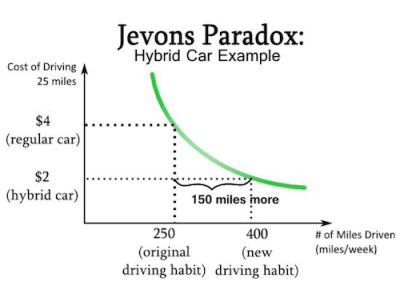Jevons Paradox (JP)
“More efficient you make a resource the greater the demand for it”
“JP is named after William Jevons, who observed in the 19th century that an increase in the efficiency of using coal to produce energy tended to increase consumption, rather than reduce it. Why? Because, Jevons argued, the cheaper price of coal-produced energy encouraged people to find innovative new ways to consume energy.”
“The view that economically justified energy-efficiency improvements will increase rather than reduce energy consumption was first put forward by William Jevons in 1865. If it were true, JP would have profound implications for sustainability. It would imply that encouraging energy efficiency as a means of reducing carbon emissions would be futile — rather like a dog chasing its tail.”
“The JP is perhaps the most widely known paradox in environmental economics. However, governments and environmentalists generally assume that efficiency gains will lower resource consumption, ignoring the possibility of the paradox arising.”

Identify your path to CFO success by taking our CFO Readiness Assessmentᵀᴹ.
Become a Member today and get 30% off on-demand courses and tools!
For the most up to date and relevant accounting, finance, treasury and leadership headlines all in one place subscribe to The Balanced Digest.
Follow us on Linkedin!
